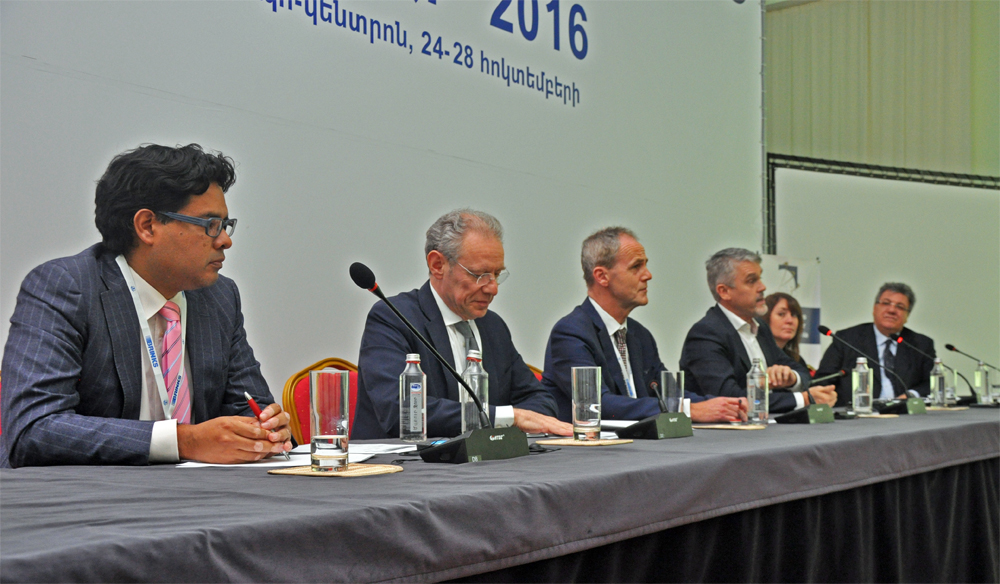More CSR work needed, as well as getting the message to the public, says panel

The CSR panel discussion in session, moderated by CIBJO President Gaetano Cavalieri (far left).
OCTOBER 26, 2016
Corporate Social Responsibility was the focus of a panel discussion held on the first day of the CIBJO Congress, and the first issue to be discussed was the efficacy of the Kimberley Process (KP) in curbing conflict diamonds and whether it is still effective and how to improve it.
The session was moderated by CIBJO President Gaetano Cavalieri.
Antwerp World Diamond Centre (AWDC) President Stephane Fischler commented that it is ironic that when an organisation such as the KP is so successful in reducing conflict diamonds, people ask if it is still a success. He gave the example of the KP’s work in monitoring the situation in the Central African Republic and the work to return it to the KP. “There is no doubt that the KP’s narrow focus has proven to be effective,” he commented.
Gemfields President and CEO Ian Harebottle asked if some of the definitions used by international organizations are too wide and leave a vacuum that needs filling.
Meanwhile, Responsible Jewellery Council Executive Director Andrew Bone said the KP has done excellent work, but media talk about a whole range of other things it should do may have created the impression that it was not completely fulfilling its mission.
“The KP is not a one-stop shop to deal with all issues, so the industry went and developed the Diamond Development Initiative and the RJC. It recognized that the KP could not deal with everything. For what it is meant to do, the KP does an excellent job,” he stated.
“There have been enormous changes in the last decade or so and that has changed the culture for the good regarding Corporate Social Responsibility. These changes are now accepted. We must continue to cooperate to stay one step ahead of our detractors,” Bone added.
Meanwhile, Responsible Ecosystems Sourcing Platform’s Executive Director Eduardo Escobedo commented that the number of changes that have been carried out in the last 20 years in sustainability efforts is extraordinary. “This is still evolving. Sustainability even five to six years ago was more about compliance and the minimum standards that firms needed to show in order to comply, but this issue is now being seen as an opportunity. There is a lot of information available about what’s happening in sustainability around the world and companies are reading about these initiatives and moving their own projects.”
Mr. Harebottle commented although the industry is working hard in creating sustainability efforts but they still need to do more. “Jewellery is still seen as luxury not a necessity and companies dealing in them are expected to do more. Corporations are seen as inherently corrupt by many people so we need to keep doing more to prove just how ethical we actually are. There is real willingness from the industry to embrace change and that is encouraging,” he said.
Meanwhile, Mr. Fischler said he was very concerned with the fragmented message the industry is sending out regarding its products and messages. “We need to decide whether its values or risk that bring us here to discuss CSR. The more we progress, the more we are challenged. We need to discuss values with our members. The industry spends a lot of time talking about CSR, but we don’t spend enough time talking about the wonder of our products to consumers.
“We need to bring the main industry organisations together to drive our strategy. We must obtain more data and analyse it. Our members must understand that CSR is an opportunity not a risk for their businesses,” Mr. Fischler stated.
The industry is reacting rather than managing the situation, Mr. Bone stated. “We are the victims of our own success. We deal in works of art and people love talking about diamonds and writing about diamonds especially famous ones. We must be more pro-active and convincing in telling the public about what we are doing.”
Also participating on the panel was Moya McKeown, a carbon foot-printing expert, who has been working with CIBJO as part of its Greenhouse Gas Measuring and Offsetting Initiative. She stressed the importance of proactive environmental responsibility, and the critical role it should play today in the industry CSR strategy.
